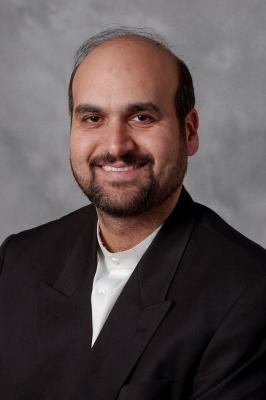
Ali Adibi is the director for the Center for Advanced Processing-tools for Electromagnetic/acoustics Xtals (APEX) at the Georgia Institute of Technology. He received his B.S.E.E. from Shiraz University (Iran) in 1990, and his Ph.D. from the California Institute of Technology in 2000. His Ph.D. research resulted in a breakthrough in persistent holographic storage in photorefractive crystals.
Dr. Adibi worked as a postdoctoral scholar at the California Institute of Technology from 1999 to 2000. In 2000, he joined the faculty of the School of Electrical and Computer Engineering at the Georgia Institute of Technology, where he is now an associate professor.
Dr. Adibi has a wide range of research interests in both theoretical and experimental aspects of photonic devices and materials. His research has resulted in more than 240 journal and more than 600 conference publications, as well as several invention disclosures and patents.
Dr. Adibi has received several prestigious awards, including the Presidential Early Career Award for Scientists and Engineers (PECASE) from the White House, CAREER Award from the National Science Foundation (NSF), and Packard Fellowship from the David and Lucile Packard Foundation. Dr. Adibi has been the conference chair for several conferences, including the "Photonic Crystal Materials and Devices" conference in the Photonics West Meeting. He has served as a technical committee member for several conferences organized by IEEE, Optical Society of America (OSA), and The International Society for Optical Engineering (SPIE). He is a senior member of IEEE and a member of Sigma Xi, OSA, SPIE, and ASM. He is also the chair of the IEEE LEOS Atlanta Chapter.
- Design, characterization, and applications of photonic crystals for chip-scale WDM and biosensors
- Photonic crystal lasers and light emitters
- Ultra-compact spectrometers for bio and environmental sensing
- Silicon photonics
- Slow light structures
- Phononic crystals for sensing and wireless communications
- Data storage and 3D optical pattern recognition using volume holograms
- Ultra-dense and ultra-fast optical interconnects
- In vivo biomedical imaging
- Presidential Early Career Award for Scientists and Engineers (PECASE) from the White House, July 2005.
- Outstanding Junior Faculty Member Award from School of Electrical and Computer Engineering, Georgia Institute of Technology, April 2004.
- Class of 1940 Howard Ector Outstanding Teacher Award from Georgia Institute of Technology, April 2003.
- CAREER Award from National Science Foundation, February 2003.
- Optoelectronics Young Investigator Award from SPIE (The International Society for Optical Engineering), January 2003.
- NASA Space Act Award for creative development of non-volatile holographic storage in photorefractive crystals from NASA, October 2002.
- David & Lucile Packard Fellowship for Science and Engineering from Packard Foundation, October 2002.
- Richard M. Bass Outstanding Teacher Award from School of Electrical and Computer Engineering, Georgia Institute of Technology, April 2002.
- SCEEE (Southeastern Center for Electrical Engineering Education) Young Faculty Development Award, July 2001.
- Charles H. Wilts Prize for research in electrical engineering leading to a doctorate (best thesis in Electrical Engineering), California Institute of Technology, June 2000.